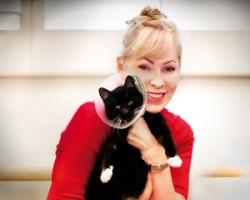
Those of you who are long-time Seal Beach residents may remember Helen Sanders, even if her name isn’t familiar.
She was an oft-seen presence at the First Street Jetty, where she would feed the scores of feral cats that made their home there.
She was often seen riding her three-wheeled bike, with a huge bag of cat food in the basket.
The feral cats are gone from the Jetty and Helen Sanders died of cancer in 2005, but her work for cats has continued. Deborah Felan-Magaldi, an Old Town resident, now helps run the Helen Sanders Cat Protection and Welfare Society (CatPAWS).
“People call me a co-founder, but that’s not really true. I helped the organization get its non-profit status,” Felan-Magaldi said.
Annelle Aviani-Baum, CatPAWS founder, works with about 20 volunteers to help cats. Some are homeless, some are adopted out of high-kill shelters and some are feral.
“Now we collaborate on saving some lives,” Felan-Magaldi said.
Today the cats being helped are in one of several places: Living with foster volunteers until they can be adopted; or on display at PetCo next to Whole Foods just across the Seal Beach border with Long Beach, or Pet Smart in the Seal Beach-Rossmoor Center.
The time the cats spend at the pet stores can vary widely.
Some are adopted within a day and others may spend weeks or even months there. And some of the cats have to be in homes with foster families because the pet stores are too stressful for them.
Felan-Magaldi says she sometimes feels she is “bailing the ocean with a teaspoon,” but she emphasizes that she loves helping save the lives she is able to.
However, this work takes money, and the organization would love to have more donations so it can expand its spay and neuter program.
Because, in the end, spaying and neutering domestic cats and dogs is what will keep the unwanted kittens and puppies out of area shelters.
In addition, monetary donations are used for cat food, litter and medical expenses.
Often, the cats that CatPAWS adopts from high-kill shelters need medical attention and have become unadoptable.
That was the case with a recent cat that came into the program named Hunter.
The buff-colored beauty was covered in mange when Felan-Magaldi saw him at a high-kill shelter.
“I just knew no one would adopt him in that condition and that he would be killed,” she said.
After getting Hunter to a vet to be treated, he became a beautiful, healthy cat who can now be seen at PetCo.
Another cat rescued by CatPAWS, Tux, was blind in both eyes. Felan-Magaldi initially turned Tux down, until the shelter emailed her his picture.
“That was it. I had to take him. And he eventually got adopted and his people love him,” she said.
CatPAWS has a website where donations can be made (they have Pay Pal) www.helensanderscatpaws.com. Checks can be mailed to CatPAWS 1198 Pacific Coast Highway, Suite D, Seal Beach 90740.
And any checks brought into the Sun office in Seal Beach will be given to the organization.
They can be reached by phone at 562-280-4450.
“Anything can help. Even $1,” Felan-Magladi said.
CatPAWS is on Facebook at www.facebook.com/pages/Helen-Sanders-CatPAWS.
The Seal Beach Animal Care Center is a “no-kill” shelter, which is why CatPAWS doesn’t adopt from there. CatPAWS cats come from high-kill shelters so their lives can be spared.



